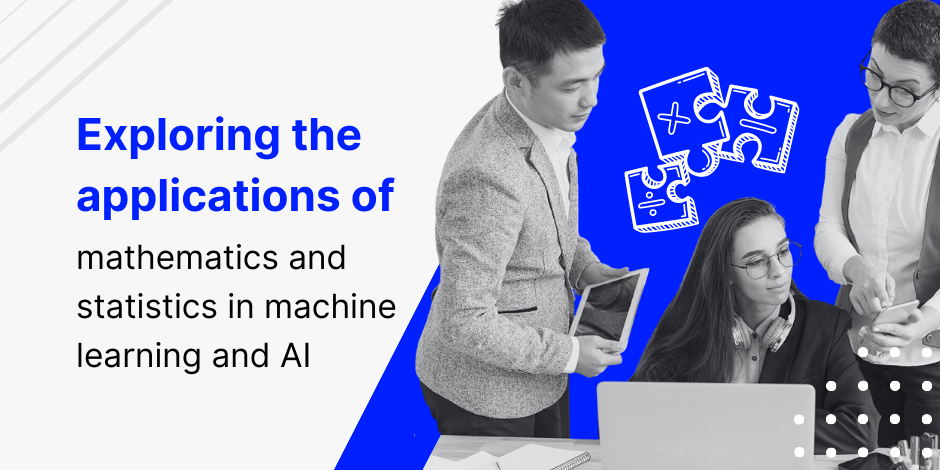Exploring the Applications of Mathematics and Statistics in Machine Learning and AI

Stay Informed With Our Weekly Newsletter
Receive crucial updates on the ever-evolving landscape of technology and innovation.
A very common question when considering a career change to data science and machine learning is, how important is maths in data science and machine learning?
Mathematics is a tool used to understand how we function in this world. Bertrand Russell, the philosopher who proved through deduction logic that one plus one equals two, stated that the true spirit of delight is to be found in mathematics as surely as in poetry.
This article is going to answer your questions regarding the relationship between mathematics and data science. Once you have explored the applications of mathematics and statistics in machine learning and AI, you will discover the exciting career prospects that are in store for you.
How is mathematics and statistics used in machine learning and AI?

Mathematics and statistics are fundamental concepts in machine learning and AI. Mathematics is essentially a numerical method of expressing ideas. Statistics is a more abstract form of communicating ideas.
The simplest way to define artificial intelligence (AI) is machine learning from experience. Machine learning goes a step further to formulate decisions with the results from its experience.
The application of mathematics and statistics underpins the coding within machines. Data scientists are tasked with wrangling and extracting insight from data using mathematical models.
Then, machine learning algorithms use this data to recount a story by further data analysis. Stakeholders can use these predictions and data patterns to make more informed business decisions.
Mathematics and statistics are key tools in data science, machine learning, and AI to extract insight and uncover hidden patterns in the data.
Once you have developed a conceptual and practical understanding of mathematics and statistics for data science and AI, you will be able to produce more innovative solutions and methods of handling data and visualising your findings.
You may already have the level of mathematics skills required to upskill in data science
A number of professionals already have the level of maths required to upskill in data science easily.
Accountants
Accountants have the mathematics and statistics knowledge required for a career change to data science. Your skills in logic and problem-solving will definitely assist you with understanding the underlying concepts of machine learning.
Actuaries
Data science is transforming the insurance industry and the way in which actuaries predict financial risks. There is an extensive level of maths required in order to calculate and contain risk. Actuaries collate all the raw statistical data in order to present quantitative data.
Insurance underwriters
Similar to actuaries, insurance underwriters have the level of maths required to upskill to data science quickly. Underwriters use maths constantly in their work in order to accurately generate rates for risk and manage the capacity levels and risk loss ratios of individual risk.
Financial analysts
Financial analysts have a number of transferrable skills to understand the essentials of machine learning. Financial analysts solve problems with tools used in data science, such as mathematical models.
Statisticians
Statistics is a fundamental component of machine learning and statisticians can easily upskill with their existing knowledge. The only way to represent data is with a statistical framework. Data scientists work with statistics to optimise the performance of machines with the final outcome of interpreting data.
The current applications of mathematics and statistics in data science

Mathematics and statistics play a central role in data science. A data scientist who cannot grasp maths is similar to a musician who cannot play a musical instrument well. You can only really go so far with limited skills.
While many articles state that maths is not important and not needed, that argument is challenged by examples of the current applications of mathematics and statistics in data science:
- Calculus – lower the error of machine learning predictions
- Linear algebra – helps interpret the data collected
- Mathematical models and algorithms – equations and functions are used to predict potential data and decide how to make the best use of the data
- Optimisation – formulate the best outcome or performance
- Probability – continue developing AI’s ability to make decisions
- Statistics – underpins machine learning
In summary, you could get away with no maths background with entry-level data science roles. However, the more exciting tasks involve essential concepts in mathematics and statistics. You will find that your career prospects will have a wider scope once you have developed the level of maths required.
How can I learn the level of maths needed for data science?
Please do not fear if maths is not your strong point! Mathematics is like driving; the more experience and exposure you have, the more confident you are to assess what is ahead of you. In essence, mathematics is really about searching for the truth using logic, and your determination to study maths is what will help you learn.
A conceptual understanding of mathematics and statistics is a great foundational knowledge base for becoming trained in the practical applications of statistics and mathematics for data science.
Ultimately, you will need to understand the level of mathematics you will be required to use on the job in the data science industry.
To accelerate your study, completing an industry-level course that teaches you the practical mathematics required for a career change to data science would be beneficial. This will relieve the stress associated with the pressures of self-learning and will give you the opportunity to learn from industry practitioners.
The emerging job opportunities in machine learning and AI in Australia

The emerging job opportunities in machine learning and AI spans nearly every industry. The future outlook for data scientists is very promising because every sector works with data in some form.
Industries are struggling to cope with the influx of data that is bombarding their systems, with many companies hiring data science talent to organise their messy data. Data science skills have been continually forecasted to be in demand.
We are living in a data-driven world. Many professions can benefit from data science skills to help them understand the data they are working with.
Here are the top three in-demand roles in data:
- Machine learning engineer
- Data scientist
- Business intelligence developer
Conclusion
A conceptual understanding of mathematics and statistics will broaden your career prospects in machine learning and AI and take you further in your data science career.
Continue exploring your career prospects in data science by booking a consultation with an Institute of Data consultant now. Click here to schedule a call.




